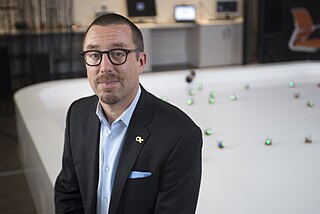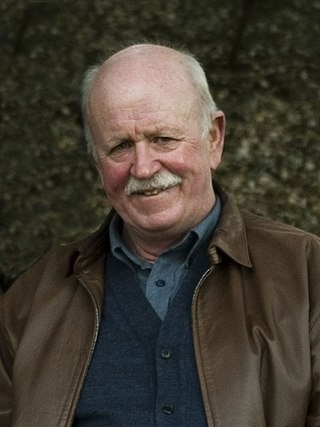Related Research Articles

Lotfi Aliasker Zadeh was a mathematician, computer scientist, electrical engineer, artificial intelligence researcher, and professor of computer science at the University of California, Berkeley. Zadeh is best known for proposing fuzzy mathematics, consisting of several fuzzy-related concepts: fuzzy sets, fuzzy logic, fuzzy algorithms, fuzzy semantics, fuzzy languages, fuzzy control, fuzzy systems, fuzzy probabilities, fuzzy events, and fuzzy information. Zadeh was a founding member of the Eurasian Academy.

Rudolf Emil Kálmán was a Hungarian-American electrical engineer, mathematician, and inventor. He is most noted for his co-invention and development of the Kalman filter, a mathematical algorithm that is widely used in signal processing, control systems, and guidance, navigation and control. For this work, U.S. President Barack Obama awarded Kálmán the National Medal of Science on October 7, 2009.
John Ralph Ragazzini was an American electrical engineer and a professor of Electrical Engineering.

Magnus B. Egerstedt is a Swedish-American roboticist who is the Dean of the Henry Samueli School of Engineering at the University of California, Irvine. He was formerly the Steve C. Chaddick School Chair and Professor at the School of Electrical and Computer Engineering, Georgia Institute of Technology.
The Richard E. Bellman Control Heritage Award is an annual award given by the American Automatic Control Council (AACC) for achievements in control theory, named after the applied mathematician Richard E. Bellman. The award is given for "distinguished career contributions to the theory or applications of automatic control", and it is the "highest recognition of professional achievement for U.S. control systems engineers and scientists".

The American Automatic Control Council (AACC) is an organization founded in 1957 for research in control theory. AACC is a member of the International Federation of Automatic Control (IFAC) and is an association of the control systems divisions of nine member societies:
Kumpati S. Narendra is an American control theorist, who currently holds the Harold W. Cheel Professorship of Electrical Engineering at Yale University. He received the Richard E. Bellman Control Heritage Award in 2003. He is noted "for pioneering contributions to stability theory, adaptive and learning systems theory". He is also well recognized for his research work towards learning including Neural Networks and Learning Automata.

Gene F. Franklin was an American electrical engineer and control theorist known for his pioneering work towards the advancement of the control systems engineering – a subfield of electrical engineering. Most of his work on control theory was adapted immediately into NASA's U.S. space program, most famously in the control systems for the Apollo missions to the Moon in 1960s–1970s.
Michael Athans was a Greek-American control theorist and a Professor Emeritus in the Department of Electrical Engineering and Computer Science at the Massachusetts Institute of Technology. He was a Fellow of the IEEE (1973) and a Fellow of the AAAS (1977). He was the recipient of numerous awards for his contributions in the field of control theory. A pioneer in the field of control theory, he helped shape modern control theory and spearheaded the field of multivariable control system design and the field of robust control. Athans was a member of the technical staff at Lincoln Laboratory from 1961 to 1964, and a Department of Electrical Engineering and Computer Science faculty member from 1964 to 1998. Upon retirement, Athans moved to Lisbon, Portugal, where he was an Invited Research Professor in the Institute for Systems and Robotics, Instituto Superior Técnico where he received a honoris causa doctorate from the Universidade Técnica de Lisboa in 2011.
The Rufus Oldenburger Medal is an award given by the American Society of Mechanical Engineers recognizing significant contributions and outstanding achievements in the field of automatic control. It was established in 1968 in the honor of Rufus Oldenburger.
Miroslav Krstić is an American control theorist and Distinguished Professor of Mechanical and Aerospace Engineering at the University of California, San Diego (UCSD). Krstić is also the director of the Center for Control Systems and Dynamics at UCSD and a Senior Associate Vice Chancellor for Research. In the list of eminent researchers in systems and control, he is the youngest.
Richard D. Braatz is the Edwin R. Gilliland Professor at the Massachusetts Institute of Technology known for his research in control theory and its applications to chemical, pharmaceutical, and materials systems.
Stephen Yurkovich is a Fellow of the IEEE, and holds the Louis Beecherl Jr. Distinguished Chair in Engineering at the University of Texas at Dallas, United States, where he is also Program Head of Systems Engineering. Until early 2011, he held a joint appointment as Professor of Electrical and Computer Engineering, and Mechanical Engineering, at The Ohio State University, where he was also Director of the Honda-OSU Partnership Program in which he oversaw endowments of over $40M. Also at Ohio State, he served as Acting Director of the Center for Automotive Research in 2007.

Stephen P. Boyd is an American professor and control theorist. He is the Samsung Professor of Engineering, Professor in Electrical Engineering, and professor by courtesy in Computer Science and Management Science & Engineering at Stanford University. He is also affiliated with Stanford's Institute for Computational and Mathematical Engineering (ICME).
Thomas Flynn Edgar is an American chemical engineer.

Arthur James Krener is an American mathematician. He is a distinguished visiting professor in the department of applied mathematics at the Naval Postgraduate School. He has made contributions in the areas of control theory, nonlinear control, and stochastic processes.
Dawn Marie Tilbury is an American control theorist whose research topics include logic control, networked control systems, robotics, human–machine systems, and autonomous vehicles. She is a professor of mechanical engineering and of electrical engineering and computer science at the University of Michigan, and the head of the directorate for engineering at the National Science Foundation.
Frank L. Lewis is an American electrical engineer, academic and researcher. He is a professor of electrical engineering, Moncrief-O’Donnell Endowed Chair, and head of Advanced Controls and Sensors Group at The University of Texas at Arlington (UTA). He is a member of UTA Academy of Distinguished Teachers and a charter member of UTA Academy of Distinguished Scholars.
Maamar Bettayeb is a control theorist, educator and inventor. He is the author of publications on understanding the singular value decomposition and model order reduction. Bettayeb is also a promoter of scientific research.
Hassan K. Khalil is an Egyptian-born American electrical engineer. He was named Fellow of the Institute of Electrical and Electronics Engineers (IEEE) in 1989 for contributions to singular perturbation theory and its application to control.
References
- ↑ "AACC Awards". 2013 American Control Conference. Washington, DC, US. 2013. pp. 1–3. doi:10.1109/ACC.2013.6579793.
- ↑ "AACC awards for 2005". Proceedings of the 2005 American Control Conference. Portland, OR, US. 2005. pp. 12–18. doi:10.1109/ACC.2005.1469893.
- ↑ "AACC Awards 5 awards". 2019 American Control Conference (ACC). Philadelphia, PA, US. 2019. pp. 1–5. doi:10.23919/ACC.2019.8814605.
- ↑ Ragazzini, John R.; Zadeh, Lotfi A. (1952). "The analysis of sampled-data systems". Transactions of the American Institute of Electrical Engineers, Part II: Applications and Industry. 71 (5): 225–234.
- ↑ Ragazzini, John R.; Randall, Robert H.; Russell, Frederick A. (1947). "Analysis of problems in dynamics by electronic circuits". Proceedings of the IRE. 35 (5): 444–452.
- ↑ Bergen, R. Arthur; Ragazzini, R. John (1954). "Sampled-data processing techniques for feedback control systems". Transactions of the American Institute of Electrical Engineers, Part II: Applications and Industry. 73 (5): 236–247.
- ↑ Zadeh, Lotfi A.; Ragazzini, John R. (1950). "An extension of Wiener's theory of prediction". Journal of Applied Physics. 21 (7): 645–655.